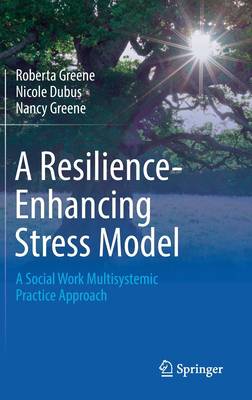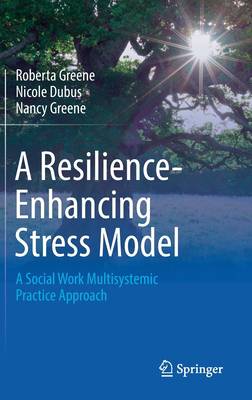
- Afhalen na 1 uur in een winkel met voorraad
- Gratis thuislevering in België vanaf € 30
- Ruim aanbod met 7 miljoen producten
- Afhalen na 1 uur in een winkel met voorraad
- Gratis thuislevering in België vanaf € 30
- Ruim aanbod met 7 miljoen producten
Zoeken
A Resilience-Enhancing Stress Model
A Social Work Multisystemic Practice Approach
Roberta Greene, Nicole Dubus, Nancy Greene
Hardcover | Engels
€ 116,45
+ 232 punten
Uitvoering
Omschrijving
Social work practice has evolved to meet the needs of the time, the problems that are present, and the knowledge and skills available. Given the more recent rapidly changing stressful environments, political, economic, demographic, sociocultural, and ideological change has affected how practice is defined. Now it is even more essential for there to be innovative theoretical concepts and intervention strategies to support current practice. This textbook addresses today's context of social work practice that needs to deal with the complexity of personal and social relationships, the continuing historical flux of the times, and the constant anxiety or "threats and pulls" of daily life.
The text is based on the idea that social work practice requires a research and theoretical base that allows practitioners to build on a client's ability to persist in the face of life's challenges and to proceed positively with life events. The Resilience-Enhancing Stress Model (RESM) is an outgrowth of the profession's interest in strength-based person-environment approaches -- grounded in generalist social work practice that offers a range of intervention practice methods with diverse individuals, families, groups, organizations, and communities. RESM was developed to provide the skill set for working with clients and constituencies across the individual-family-community configuration during times of distress. It also can be a welcomed addition to social work practice with people undertaking life transitions and overcoming disruption to individual, family, and community function.
Topics explored include:
The text is based on the idea that social work practice requires a research and theoretical base that allows practitioners to build on a client's ability to persist in the face of life's challenges and to proceed positively with life events. The Resilience-Enhancing Stress Model (RESM) is an outgrowth of the profession's interest in strength-based person-environment approaches -- grounded in generalist social work practice that offers a range of intervention practice methods with diverse individuals, families, groups, organizations, and communities. RESM was developed to provide the skill set for working with clients and constituencies across the individual-family-community configuration during times of distress. It also can be a welcomed addition to social work practice with people undertaking life transitions and overcoming disruption to individual, family, and community function.
Topics explored include:
- An Evolving Resilience-Enhancing Stress Model
- Interviewing to Promote Resilience Among Marginalized Populations
- Co-creating a Grand Narrative: The Intersection of Individual, Family, and Community Practice
- Connecting Communal Living, Ecology, and Resilience
Specificaties
Betrokkenen
- Auteur(s):
- Uitgeverij:
Inhoud
- Aantal bladzijden:
- 166
- Taal:
- Engels
Eigenschappen
- Productcode (EAN):
- 9783031081118
- Verschijningsdatum:
- 24/08/2022
- Uitvoering:
- Hardcover
- Formaat:
- Genaaid
- Afmetingen:
- 156 mm x 234 mm
- Gewicht:
- 449 g

Alleen bij Standaard Boekhandel
+ 232 punten op je klantenkaart van Standaard Boekhandel
Beoordelingen
We publiceren alleen reviews die voldoen aan de voorwaarden voor reviews. Bekijk onze voorwaarden voor reviews.











